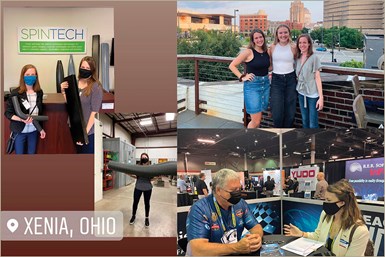The Art of Letting Live and Letting Go
A sense of control—over our work and personal lives—has been fleeting as the pandemic continues. Becoming a COVID-19 employee and learning to navigate my position remotely has taught me that maybe this isn’t such a bad thing.
#copywriting
Employee Spotlight Profile
Grace Nehls, Managing Editor, CompositesWorld and MoldMaking Technology

With graduation cancelled due to the pandemic and a cap and gown on the way, I had to find a way to get some use out of them . . . so why not some impromptu pictures?
Those who know me well know I’m a very structured, detail-oriented person, in the work that I put out, as well as my daily life. From the time I wake up, to the moment my head hits the pillow, I live by a (somewhat) strict routine, and I like to maintain it, when I am able. I’m sure much of this preferred lifestyle is the result of 18 years as a dancer (11 years competitively), which involved a very tight weekly schedule of classes and practice in addition to my academics, as well as my diligence as a student up until college graduation. In general, having maintained such an active life that left little room for much else has certainly factored into an unconscious philosophy to make every minute of my day count. It has also enhanced an inherent need for control over my daily, weekly and monthly schedule, and to always be prepared for what life throws at me.
Take this self-reflection as a prime example. Since the age of eight, I’ve known the type of job I wanted to pursue (becoming a full-time fantasy/sci-fi author, though this is still in the works). Since freshman year of high school, when I transferred to the School for Creative and Performing Arts (SCPA) and majored in creative writing, I knew I wanted to continue in this field in college; and in a similar fashion, after looking at only a few schools, instantly knew the college that felt right for me. All of these small certainties where others often struggle left me in complete control. I knew what I wanted, and I knew how to get there, and each decision felt like an affirmation that I was doing everything—doing life—correctly.
That is, before the pandemic. That dreaded word—even to me, it feels exhausted, gray-washed and wrung out of its urgency. Carefully determined plans and expectations, all thrown out the window because of that word. No one can control a pandemic once it begins—it’s as inevitable as the sun rising—but that doesn’t mean we have to like it.
All that time spent planning to begin my job search after a December graduation, including the resume and cover letter preparations and interview practices, slowly drained away, first with the rumor of COVID-19 in the U.S., and then the March 2020 shutdown. In fact, I had just completed two preliminary interviews with Gardner for an assistant editor position and had begun the interview process with a few other prospects when the news came. Anxiety was high. I didn’t know what I was going to do if companies were laying off rather than hiring in my field, and private loans (sequestered from the federal student loan pause) were coming due. At the time, it felt like the time, effort and control I had invested to enter the workforce was spiraling.
But boy, was I proved wrong. I got the job I was worried about not getting—located in the same area that my parents reside, of all places. I even began earlier than I had anticipated. I did spend my first year entirely remote, which proved to be challenging in an industry you know little about, but I survived. Almost two years later (I hit the two-year mark in April) and I’m thriving in a position and environment I never knew I’d do well in.
So, what have these experiences and my time as an assistant editor revealed to me?
First, control is not all it’s cut out to be. It’s an inherent aspect of human nature to want/need control in how we speak, react emotionally and control the direction of our lives; the echoes of these wants are often passed down through the ages, often, from my experience, taking the form of fictional individuals, worlds and circumstances—the Wheel of Time’s Aes Sedai are lauded and admired for the seeming cool control they have over features, words and actions. Chava, a golem who has lost her master in an 1899 New York, wanders aimlessly through the city devoid of purpose, compulsively searching for that which will guide her for the duration of her long life. An Antari magician with the rare, coveted ability to travel between parallel Londons—Red, Gray and White—secretly wanders into Black London, walled off long ago for good reason, just so he can feel in control of the things he chooses to do, over the things he’s ordered to do.
There are numerous examples, but I think you get the gist. Just because it’s something we admire and work toward, doesn’t mean it’s the end all be all. Instead, having control over everything, or attempting to, often means you’re going to end up disappointed in the end if it doesn’t go your way. Disappointment can lead to frustration, frustration to resentment. You think that perhaps if you had taken a different path, it might have had the desired effects and your grip to control tightens. You begin to lose trust in the very things that are natural, such as making mistakes. And then stress and anxiety begin to take over.

My time so far at Gardner hasn’t all been spent in my cubicle. With the rise and fall of the pandemic, I’ve also had the opportunities to visit a couple facilities, experience two of my first trade shows and get to know my team better outside of work.
This is also one the most important lessons I have accidentally gained as what I like to call a “COVID-19 employee.” When managing two magazines with varying topics, writers/designers, production processes and expectations, for example, one may find themselves relying on developing the most efficient methods possible to ensure everything runs smoothly each month. This is easy to do once you’ve done it enough. However, at the same time, the process—and the timing of that process—can change on a whim. Maybe it’s the holidays and most of your staff is off for the next two weeks. Maybe there are trade shows, conferences and plant tours going on while you sit at your office desk, whittling away at your to-do list. Thinking ahead then becomes an inherent part of that process, which helps with better control.
Nevertheless, you can only control so much. Things change last-minute. Articles are cut, maps are altered, ads come in or are removed—COVID-19, in my opinion, has only made this more volatile. All of these things and more can, in turn, affect that efficient production process you’ve worked so hard to maintain, in order to meet deadlines for passing the magazines to print. It’s easy to beat yourself up over not planning for the eventualities, but there’s no way of knowing when it comes; sometimes I’ve found myself making drastic changes to something the day before having to head to the printer. And that’s the life lesson: At some point you must learn to let go of those small eventualities. As much as I’ve learned print production adheres to strict deadlines, it also doesn’t. Contradictory, I know.

The good ‘ol days when I (far right middle) traveled to dance competitions twice a month. I’ve discovered they’re not so different from trade shows in that you’re stuck in a convention center for the duration of your stay.
This philosophy is letting live and letting go is not an easy one to implement. I can tell you now I am far from it. There are still some things the perfectionist part of me will never let go, which is not always such a bad things for a print production editor, when several proofs and miniscule changes later can have a big impact on a monthly issue, and I still like to prepare for everything when I can. But I’m working hard to improve on letting go of the things that aren’t worth stressing over, something that has slowly become more feasible as my time at Gardner has progressed, and I have grown more comfortable in my role as assistant editor and recent promotion to Managing Editor. I have also learned to accept the route my life has taken so far—it may not be what I ever expected, with or without a pandemic, but I can’t possibly complain in my position. I’m happy, healthy, I have a job and besides, life is always chock-full of surprises; the role I’ve found myself in is definitely a pleasant and wholly unexpected one.
J.R.R. Tolkien’s 1954 “The Fellowship of the Ring” sums all of this up—pandemic, philosophy and all—quite nicely (also because I’m listening to the soundtrack as I write this): “I wish it need not have happened in my time,” said Frodo. “So do I,” said Gandalf, “and so do all who live to see such times. But that is not for them to decide. All we have to decide is what to do with the time that is given us.”
So, if you’re like me (i.e., you hold high expectations for yourself, you tend to be a workaholic and control feels like your lifeline) remember to occasionally let live and let go. The results may surprise you.
Need more information?
Grace Nehls, Managing Editor
CompositesWorld and MoldMaking Technology
LinkedIn
About the Author
Grace Nehls
After earning her bachelor’s degree in creative writing from Miami University in Oxford, Ohio, Grace joined the CompositesWorld and MoldMaking Technology team in April 2020 as assistant editor for print production and was promoted to Managing Editor in January 2022. She has been an editorial intern for two independent publishing presses and marketing director for one of Miami’s magazine publications.
RELATED CONTENT
-
Why You Should Doubt Headline Best Practices Advice (Except This)
The headline isn’t six words long. And, according to advice on the internet, that’s the optimal headline length. You might have spotted a clue that signals how suspect that advice is. The very headline that promises to reveal the optimal word count comes in at double that “ideal” length.
-
Getting Comfortable Outside of my Comfort Zone
Digital Assistant Editor Nate Fields describes his path toward working in the manufacturing industry.
-
Psychological Tactics to Write Attention-Grabbing Headlines
A headline can be as important as the content itself. A study found that 59 percent of articles shared on social media weren’t even clicked on by the user. Headlines are a critical component in your online marketing efforts, and readers use headlines to make a snap judgment about your content. When you improve content headlines in your online business, the needle will move. Here are four techniques that will make your next headline more persuasive.


